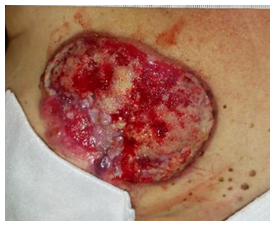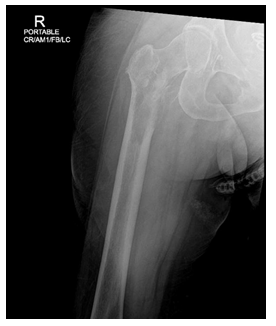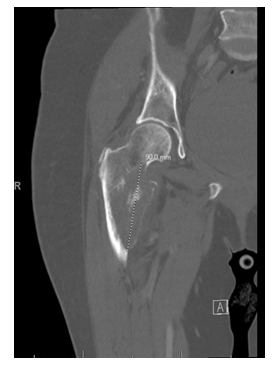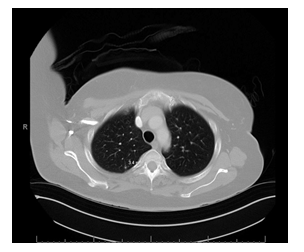Fear of Diagnosis: A Case of Tumor Neglect in Breast Cancer
Article Information
Clarke TR1*, Roa C2
1Assistant Professor of Clinical Medicine, Division of Hospital Medicine and UHealth International Department of Medicine, University of Miami, Miller School of Medicine, Florida, United States
2Medical Student, University of Miami, Miller School of Medicine, Florida, United States
*Corresponding author: Tanya Roxanne Clarke, Assistant Professor of Clinical Medicine, Division of Hospital Medicine and UHealth International Department of Medicine, University of Miami, Miller School of Medicine, Florida, United States
Received: 09 June 2022; Accepted: 17 June 2022; Published: 13 August 2022
Citation: Clarke TR, Roa C. Fear of Diagnosis: A Case of Tumor Neglect in Breast Cancer. Archives of Internal Medicine Research 5 (2022): 431-434.
View / Download Pdf Share at FacebookAbstract
A 57-year-old female presented to the emergency room with chief complaints of sudden severe right hip pain and an inability to walk. On examination, she was found to have a mass on her right femur and an ulcerated mass on her right breast, and she admitted to having the growing breast mass ftor 7 months prior. Imaging of the right femur revealed a 9 cm lytic lesion. Resection and biopsy resulted in a diagnosis of metastatic adenocarcinoma of breast origin. She has no economic, social, or geographic barriers to medical care. She cited fear and anxiety of receiving a diagnosis of breast cancer as reason for delay in seeking care. She attributed this to her past negative experiences with her mother’s breast cancer journey, which led ultimately to death. This is an example of how past disease-related traumatic experiences can cause psychological barriers to seeking medical care.
Keywords
Tumor Neglect, Breast Cancer
Article Details
1. Background
Tumor neglect is a phenomenon where cancer patients delay or do not seek care for obvious visible tumors. On our service, we identified a female who presented to the hospital with advanced stage ulcerated breast cancer tumors. She only presented when symptoms related to cancer (pathological fracture, inability to ambulate) became so severe that she was forced to seek care. She presented with Stage 4 of breast cancer. She suffered in-hospital complications as a result. We believe this case is important because it is a clear example of tumor neglect and disease denial leading to poor prognosis and outcome. Her case points to a more psycho-social reason for delaying care and can help physicians further understand why patients with obvious tumor burden do not seek care. Previous studies have shown psychological factors behind delayed care seeking in cancer were related to overall defensive functioning and positively related to avoidance coping [1]. Understanding how her past experiences shaped her decisions on seeking care can allow us to better approach the subject of cancer screenings in individuals with past disease related traumatic experiences and disease related anxiety.
1.1 Objective
The objective of this case report is to highlight, understand and try to prevent the phenomenon of Tumor Neglect.
2. Case Report
A 57-year-old female presented to the emergency room for right hip pain of a 7-month duration. She has no known past medical history. She presented when her hip pain impeded her ability to ambulate An X-Ray of the right femur showed pathological fractures (Figure 2). CT scan with contrast of the right hip demonstrated lytic lesions of the right proximal femur with multiple cortical pathological fractures (Figure 3). The lesion measured up to 9 cm in the craniocaudal dimension. Further examination revealed a severely ulcerated mass on right breast (Figure 1) that she reported as getting progressively larger and more painful over the past 7 months. This started as a superficial mass measuring about 1 cm on her right breast, yet she did not disclose it to anyone despite it increasing in size and eventually becoming ulcerated. She cleaned and dressed the enlarging ulcerated wound daily with gauze and tape. CT of Chest (Figure 4) demonstrated multiple lung nodules likely representing metastatic lesions. She received a radical resection of the right proximal femur with reconstruction. Biopsy resulted in diagnosis of metastatic adenocarcinoma of breast origin, ER and PR positive, HER2 negative.
She was started on Letrozole and palliative radiation to the right hip. She was not a surgical candidate because the breast mass extensively involved the pectoralis muscle. We conducted an in-depth interview to explore her reasons for not seeking care. Her initial impression when she first noticed the breast mass was that it was likely breast cancer. However, she expressed she simply hoped it would resolve on its own. She continued to work and perform her normal activities despite her tumor growing and ulcerating in the following months. She reported having no economic, social, or geographic barriers to medical care. Her employment was stable, and she was covered by medical insurance. She had a strong social support system and stated her friends and family would have encouraged her to seek care, had they known. Her family history was relevant for breast cancer in her sister and mother. Her mother passed away from breast cancer and her sister was treated and cured. She cited anxiety and fear of breast cancer diagnosis as her reason behind not seeking care. She spoke of her negative experience with her mother’s breast cancer as the main driver of her anxiety and fear. During her hospital course, she was seen by psychiatry and diagnosed with generalized anxiety disorder. Per her psychiatric evaluation, her anxiety closely revolved around her breast cancer diagnosis and post-traumatic stress disorder related to her mother’s demise from breast cancer.
3. Discussion
Her extreme delay in seeking care and tumor neglect led to presentation at an advanced stage with poor prognosis. Furthermore, due to her late metastatic disease and femur resection with lack of mobility, she suffered an in hospital DVT despite being on daily subcutaneous enoxaparin 40 mg. Her case is a clear example of how tumor neglect and disease denial can lead to poor prognosis and increased risk of complications. Her case points to a more psycho- social reason for delaying care and can help physicians further understand why patients with obvious tumor burden do not seek care. Tumor neglect is a phenomenon where cancer patients delay or do not seek care for obvious visible tumors. On our service, we identified a female who presented to the hospital with advanced stage ulcerated breast cancer tumors. She only presented when symptoms related to cancer (pathological fracture, inability to ambulate) became so severe that she was forced to seek care. She presented with Stage 4 of breast cancer. Biopsy resulted in diagnosis of metastatic adenocarcinoma of breast origin, ER and PR positive, HER2 negative. Metastasis was found in both lung parenchyma and the right femur. She underwent a radical resection of the tumor from her right femur. She was started on Letrozole 2.5 mg daily and commenced in- patient palliative radiation to the right hip. She was not a surgical candidate for a mastectomy because the breast mass extensively involves the pectoralis muscle.
At the time of this case report, she was still admitted and receiving palliative radiation and Letrozole therapy. She suffered a DVT during the hospital course. She remained stable and was awaiting possible initiation of chemotherapy. She was referred to Psychiatry for management of her anxiety and fear and subsequently received counselling. We believe this case is important because it is a clear example of tumor neglect and disease denial leading to poor prognosis and outcome. Her case points to a more psycho-social reason for delaying care and can help physicians further understand why patients with obvious tumor burden do not seek care. Previous studies have shown psychological factors behind delayed care seeking in cancer were related to overall defensive functioning and positively related to avoidance coping [1]. Understanding how her past experiences shaped her decisions on seeking care can allow us to better approach the subject of cancer screenings in individuals with past disease related traumatic experiences and disease related anxiety.
There are many reasons patients delay seeking care for symptomatic breast cancer. A study by Heath et al investigating reasons why symptomatic breast cancer patients delayed seeking care found work responsibilities, transportation issues, and fear about not being able to afford treatment as significant drivers [2]. In addition, factors such as old age [3], socioeconomic status, and Hispanic ethnicity [4] have been shown to be associated with delay in seeking care. We explored some of these possible explanations for this case. We found none of the previously discussed demographics or circumstances explained her failure to seek care. She was not in denial as she always suspected her tumor was breast cancer. Neither did she report to have social or cultural barriers to seeking care. She was medically insured with an established primary care physician. She also had economic and social support to seek care as per in depth interview. She reported actively hiding her ulcerating breast from friends and family members. Once all other elements that could have influenced her decision were investigated, we found it was her anxiety surrounding a diagnosis as the sole driver to not seeking care.
Conflict of Interest
There is no conflict of interest, and a written informed consent was obtained from the patient to write about her case.
References
- Tromp DM, Brouha XDR, De Leeuw JRJ, Hordijk GJ, Winnubst JAM. Psychological factors and patient delay in patients with head and neck cancer. Eur J Cancer 40 (2004): 1509-1516.
- Heath J, Paulishak M, Kasales C, et al. Reasons symptomatic breast cancer patients delay seeking medical care. J Unexplored Med Data 4 (2019): 3.
- Ramirez AJ, Westcombe AM, Burgess CC, et al. Factors predicting delayed presentation of symptomatic breast cancer: a systematic review. The Lancet 353 (1999): 1127-1131.
- Richardson J, Langholz B, Bernstein L, et al. Stage and delay in breast cancer diagnosis by race, socioeconomic status, age, and year. Br J Cancer 65 (1991): 922-926.






 Impact Factor: * 3.6
Impact Factor: * 3.6 CiteScore: 2.9
CiteScore: 2.9  Acceptance Rate: 11.01%
Acceptance Rate: 11.01%  Time to first decision: 10.4 days
Time to first decision: 10.4 days  Time from article received to acceptance: 2-3 weeks
Time from article received to acceptance: 2-3 weeks 